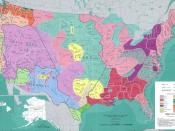Andrew Jackson was elected 7th president of the United States in 1828, beating his running mate John Quincy Adams by a massive win. His strategy was to appeal to the common people and make them believe that he was one of them, even though he was actually a wealthy plantation owner . Jackson was a follower of the traditional beliefs of the Democratic-Republican Party, which meant that he wanted more power to the people, by letting more of them vote, and favored freedom of speech and press. This brings us to Jackson's spoils system, where he rewards his supporters with government jobs , making us question his presidency.
The time of the Common Man had started four years before Jackson's inauguration. This was because of the corrupt bargain of 1824, when Henry Clay changed his votes to John Quincy Adams in return for the job of Secretary Of State. People felt that this was wrong, taking into consideration Jackson's large number of votes.
In relation, the Western states allowed all the white males the right to vote .
Although the Age of Jackson brought on increased political participation to lower class white Americans, it was in spirit a land crazed, nationalistic and Indian killing greed time.
To gain the support of democracy which at that time was considered to be only white males who were occupying the land . A large number of voters from the West led to a debate of what to do with the Native American peoples.
Being a Southerner and Indian fighter, Jackson wanted the Native Americans off the land white farmers wanted. Americas need for more land after Jefferson's successful Louisiana purchase in 1803 was also Jackson's goal, as he wanted to be as successful as Jefferson was. His desire was for them to be...


